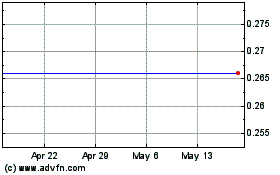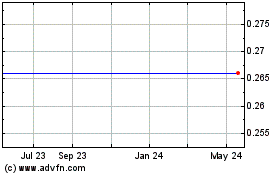Key Energy Services, Inc. (“Key” or the “Company”) (NYSE: KEG)
announced today that it has engaged Moelis & Company LLC as its
financial advisor and Sullivan & Cromwell LLP as its legal
advisor to assist the Company in analyzing various strategic
alternatives to address its capital structure and to position the
Company for future success.
In connection with this strategic review, the
Company elected not to make a scheduled interest payment due
October 18, 2019 under the Term Loan and Security Agreement, dated
as of December 15, 2016 (the “Term Loan Agreement”), by and among
Key, Cortland Products Corp., as agent, and the lenders party
thereto (the “Term Loan Lenders”) relating to the Company’s senior
secured term loan. The Company’s failure to make the October
interest payment resulted in a default under the Term Loan
Agreement and a cross default under the Loan and Security
Agreement, dated as of April 5, 2019 (as further amended, restated,
supplemented or otherwise modified from time to time, the “ABL
Credit Agreement”) by and among Key, as borrower, the Lenders party
thereto (the “ABL Lenders” and, collectively with the Term Loan
Lenders, the “Lenders”) and Bank of America, N.A. as Administrative
Agent and Sole Collateral Agent (such defaults, the “Specified
Defaults”).
On October 29, 2019, the Company entered into
forbearance agreements with Term Loan Lenders collectively holding
over 99.5% of the principal amount of the outstanding term loans
(the “Term Loan Forbearance Agreement”) and all of the ABL Lenders
(the “ABL Forbearance Agreement” and, collectively, the
“Forbearance Agreements”). Pursuant to the Forbearance
Agreements, the Lenders party thereto have agreed that, until the
earlier of December 6, 2019 or the occurrence of certain specified
early termination events, such Lenders will forbear from exercising
any default-related rights and remedies with respect to the
Specified Defaults. The Forbearance Agreements contain
certain representations and warranties of the Company and covenants
with which the Company must comply during the forbearance period,
including a requirement to maintain aggregate bank and book cash
balances of at least $10,000,000 as measured on a weekly
basis. The failure to comply with such covenants, among other
things, would result in the early termination of the forbearance
period.
The Company is in active discussions with the
Lenders regarding the Company’s capital structure and the potential
to reduce its debt level in light of challenging market
conditions.
As part of its strategic review, the Company has
determined to focus its operations on the Company’s core areas of
operations and exit certain low margin markets. The Company
believes that this will allow reductions in its cost structure and
improvements in its operating cash flow, in addition to generating
future capital expenditure savings. The Company otherwise
intends to continue to operate in the ordinary course of business
in respect of its core markets while discussions with its Lenders
take place, providing the same high level of quality service and
responsiveness that its customers, vendors and business partners
have come to expect. The Company expects that the conclusion of its
negotiations with the Lenders will not result in an impairment of
amounts owed to its trade vendors or a change of its ordinary
course operations in its core markets, including with its employees
in those markets.
Rob Saltiel, President and Chief Executive
Officer, stated, “Addressing our capital structure is a top
priority for Key, and our management and Board are working
constructively with our Lenders to reach a good outcome for our
Company. As we explore various strategic alternatives, we remain
focused on providing our customers with the same high level of
safety and service quality to which they are accustomed. While the
outlook for North American oilfield services remains challenging,
we believe that the conclusion of this process will position Key
for future success.”
Forward-Looking StatementsThis
press release contains forward-looking statements within the
meaning of the Private Securities Litigation Reform Act of 1995.
Statements that are not historical in nature or that relate to
future events and conditions are, or may be deemed to be,
forward-looking statements, including statements relating to review
of its capital structure. These forward-looking statements are
based on Key’s current expectations, estimates and projections and
its management’s beliefs and assumptions concerning future events
and financial trends affecting its financial condition and results
of operations. In some cases, you can identify these statements by
terminology such as “may,” “will,” “should,” “predicts,” “expects,”
“believes,” “anticipates,” “projects,” “potential” or “continue” or
the negative of such terms and other comparable terminology. These
statements are only predictions and are subject to substantial
risks and uncertainties and are not guarantees of performance.
Future actions, events and conditions and future results of
operations may differ materially from those expressed in these
statements. In evaluating those statements, you should carefully
consider the information above as well as the risks outlined in
“Item 1A. Risk Factors,” in Key’s Annual Report on Form 10-K for
the year ended December 31, 2018 and in other reports Key files
with the Securities and Exchange Commission.
Key undertakes no obligation to update any
forward-looking statement to reflect events or circumstances after
the date of this press release except as required by law. All of
Key’s written and oral forward-looking statements are expressly
qualified by these cautionary statements and any other cautionary
statements that may accompany such forward-looking statements.
Important factors that may affect Key’s
expectations, estimates or projections include, but are not limited
to, the following: the structure and timing of any financial,
transactional, or other strategic alternative and whether any such
financial, transactional, or other strategic alternative will be
completed; Key’s ability to adjust its debt levels; Key’s ability
to achieve the benefits of the cost efficiency and cash flow growth
initiatives; conditions in the oil and natural gas industry,
especially oil and natural gas prices and capital expenditures by
oil and natural gas companies; volatility in oil and natural gas
prices; Key’s ability to implement price increases or maintain
pricing on its core services; risks that Key may not be able to
reduce, and could even experience increases in, the costs of labor,
fuel, equipment and supplies employed in its businesses; industry
capacity; asset impairments or other charges; the periodic low
demand for Key’s services and resulting operating losses and
negative cash flows; Key’s highly competitive industry as well as
operating risks, which are primarily self-insured, and the
possibility that its insurance may not be adequate to cover all of
its losses or liabilities; significant costs and potential
liabilities resulting from compliance with applicable laws,
including those resulting from environmental, health and safety
laws and regulations, specifically those relating to hydraulic
fracturing, as well as climate change legislation or initiatives;
Key’s historically high employee turnover rate and its ability to
replace or add workers, including executive officers and skilled
workers; Key’s ability to incur debt or long-term lease
obligations; Key’s ability to implement technological developments
and enhancements; severe weather impacts on Key’s business,
including hurricane activity; Key’s ability to successfully
identify, make and integrate acquisitions and its ability to
finance future growth of its operations or future acquisitions;
Key’s ability to achieve the benefits expected from disposition
transactions; the loss of one or more of Key’s larger customers;
Key’s ability to generate sufficient cash flow to meet debt service
obligations; the amount of Key’s debt and the limitations imposed
by the covenants in the agreements governing its debt, including
its ability to comply with covenants under its current debt
agreements; an increase in Key’s debt service obligations due to
variable rate indebtedness; Key’s inability to achieve its
financial, capital expenditure and operational projections,
including quarterly and annual projections of revenue and/or
operating income and its inaccurate assessment of future activity
levels, customer demand, and pricing stability which may not
materialize (whether for Key as a whole or for geographic regions
and/or business segments individually); Key’s ability to respond to
changing or declining market conditions, including Key’s ability to
reduce the costs of labor, fuel, equipment and supplies employed
and used in its businesses; Key’s ability to maintain sufficient
liquidity; the adverse impact of litigation; and other factors
affecting Key’s business described in “Item 1A. Risk Factors” in
its Annual Report on Form 10-K for the year ended December 31,
2018, and other reports Key files with the Securities and Exchange
Commission.
About Key Energy ServicesKey
Energy Services is the largest onshore, rig-based well servicing
contractor based on the number of rigs owned. Key provides a
complete range of well intervention services and has operations in
all major onshore oil and gas producing regions of the continental
United States.
Contact:Marshall Dodson713-651-4403
Key Energy Services (NYSE:KEG)
Historical Stock Chart
From Feb 2025 to Mar 2025

Key Energy Services (NYSE:KEG)
Historical Stock Chart
From Mar 2024 to Mar 2025
